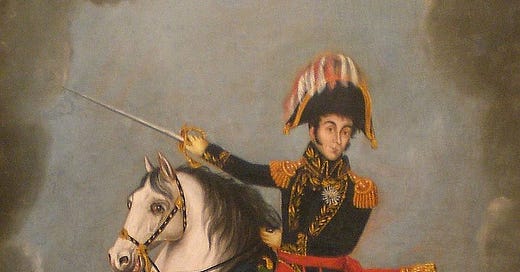John Lynch, Simon Bolivar: A Life (New Haven, CT: Yale University Press, 2003), pgs. 368.
John Lynch, a former professor of Latin American history at the University of London, acknowledges the fine line he treads in crafting a biography of Simon Bolivar, the famous “Liberador” of South America. The echoes of Thomas Carlye’s Great Man History are strong enough that Lynch confronts the specter head on as he attempts to craft a narrative that acknowledges the achievements of Bolivar without entering the realm of Great Man History. The result is a fascinating biography where Lynch presents a complicated picture of one of Latin America’s most famous people who profoundly shaped the evolution and success of South American independence from Spain.
For Lynch the story of Bolivar is one of contradictions and evolution that must be framed in an Atlantic world setting and in conjunction with the chaos surrounding the Age of Revolutions. Lynch organizes his chapters chronologically, taking the reader across the life of Simon Bolivar in the three stages of his life; revolution, independence, and state building. Throughout these three periods Lynch interweaves several important themes into every chapter including the role of racial hierarchies, Bolivar as Enlightenment realist, and the realities of state building. These themes help undergird the larger narrative that places Bolivar as a complicated, but world altering leader.
Bolivar, as a white creole elite, had a vastly different trajectory in life than the majority of his fellow colonists. While most people of colonial Venezuela inhabited a lower racial caste, Bolivar as a white creole had access to a unique world of letters and access to imperial power. However, Lynch is quick to note that with the late Bourbon reforms of the 1780s, the avenues for creole elite to access positions of authority in the empire were rapidly closing or being removed. The increasing “imperialism” of the Spanish empire in turn prompted greater creole resistance as they focused on maintaining their status atop the racial hierarchy of Venezuela. Ever fearful of slave revolts, creoles were opportunistic in siding with whatever side could best protect their interests.
This fear appears again and again as creoles like Bolivar seek to shield their world from racial equality. Pardos, or people of African descent, are a constant worry for Bolivar, who though slightly promoting anti-slavery following his time in Haiti, does little to create a total equality. He furthermore confronts Black royalists who see the creoles as a larger threat to Black liberation than the Spanish monarchy. The problem of how to deal with people of color and Native descended peoples plagues Bolivar throughout his life leading him at times to react brutally against people of African descent.
The other major theme, Bolivar as an Enlightenment realist is of particular importance to Lynch’s narrative. Unlike some who would frame Bolivar as drawing from European and North American ideas, Lynch frequently notes that though Bolivar is extensively reading the works of Enlightenment and Revolutionary thinkers, he is himself created his own realistic philosophy that can be applied to the South American Spanish colonies. Lynch is sympathetic to Bolivar’s philosophic ideas, frequently arguing that Bolivar’s ideas reflected a more accurate understanding of the realities of Spanish rule and its affects on the colonists at large. Thus, in a rather significant way, Lynch preserves Bolivar as a type of Great Man. Rather than being solely a product of his education and the elite culture of the Atlantic world, Bolivar, through some internal instinct, is crafting his own path to glory. Important to Bolivar’s role as an Enlightenment realist is his sense that abstract ideas often play out very differently when put into practice. State building thus became the arena in which Bolivar melded philosophy with reality.
As Lynch traces Bolivar’s efforts at state building, he is careful to note the negative aspects of Bolivar’s rule, including the violence and brutality against those who opposed him. Rather than a great and benevolent man, Bolivar is complicated. Still, Lynch is careful to not totally critique Bolivar’s efforts to establish a strong central, and some might argue dictatorial, government in northern South America. For Lynch, Bolivar is acting out of the best interest of his people, rather than out of selfish motives. Bolivar is scrappy and at times unprincipled, but above all he cares for the freedom of his people. A man of action, who wielded the sword and pen to produce freedom for the people of South America, Bolivar’s efforts at state building are fragile and often unsuccessful. Lynch is quite sympathetic to Bolivar’s view that his people were not ready for democracy and needed the schooling of a unified and centralized government under Bolivar’s leadership. And despite Bolivar’s eventual fall from grace in his own Gran Colombia, Lynch sees his efforts as valid, though certainly unperfect.
Lynch’s work is fast flowing and captures a complex world that is rapidly during Bolivar’s lifetime. While Lynch is clearly in favor of Bolivar, perhaps more have been done to view colonial Venezuela from the lens of the royalists than from Bolivar’s perspective. Bolivar, writing in defense of his revolution, perhaps obscured and demonized officials. While it is easy to paint the perspective of the heroic victor, what can be hard is moving past their biases. Lynch frequently does this, but fails to do so in his early descriptions of colonial Venezuela.
Overall this was a fascinating biography and one that is thought provoking and excellently researched. While certainly it has its flaws, Lynch has done an excellent job in capturing the story of one of Latin America’s iconic figures.
Robert Swanson




